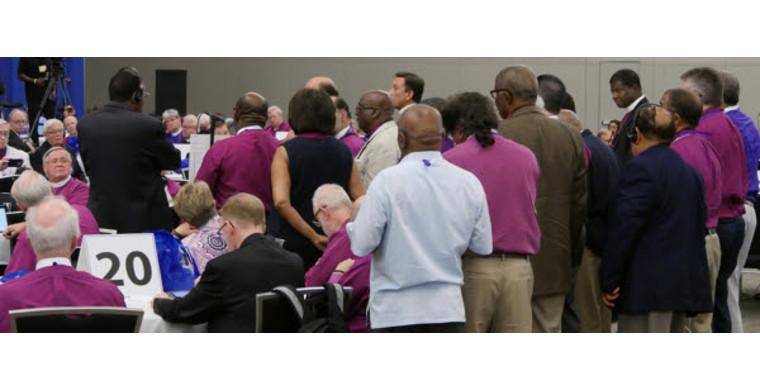AUSTIN, TX: Episcopal Church forgot about company manners
Honduran Bishop threatens to walk out
By Mary Ann Mueller
VOL Special Correspondent
www.virtueonline.org
July 7, 2018
The Episcopal Church is throwing the biggest party in three years -- General Convention.
The triennial event is a mixture of travelling roadshow -- this year it is in Texas -- three ring circus, camp meeting and family reunion. As former Presiding Bishop Katharine Jefferts Schori used to brag, The Episcopal Church is in 17 foreign countries, making TEC more or less The Episcopal Communion.
The Episcopal Church has congregations in Europe: Austria, Belgium, France, Germany, Italy and Switzerland; in the Caribbean: the Dominican Republic, Puerto Rico, the Virgin Islands and Haiti; in the Pacific: Guam and the Northern Mariana Islands in Micronesia and Taiwan; in South America: Columbia, Ecuador and Venezuela; and Honduras in Central America.
The Episcopal Church is also courting with the idea of reuniting with the Episcopal Church of Cuba. Cuba's Bishop, Griselda Delgado del Carpio (VIII Cuba), was on hand to witness that debate.
A wide variety of languages and dialects are spoken in The Episcopal Church, including: American English, Elizabethan English, Spanish, French, German, Italian, Dutch, Creole and Chinese with a smattering of Hawaiian and Navajo. By far, the second most common language in the church is Spanish.
This is where the problem came in on Thursday (July 5) when there was no Spanish interpreter available for the Spanish-speakers during the hearings for Resolution B012 on marriage equality nor documents translated into Spanish in time to be usable during the live debating.

His anger and frustration spilled over in the House of Bishops on Friday (July 6).
There are several native Spanish speakers in the House of Bishops, including bishops Lloyd Allen (V Honduras); David Álvarez, (VI Puerto Rico); Francisco Duque-Gómez (IV Colombia); Orlando Guerrero (III Venezuela); Alfrado Morante (II Litoral Ecuador); Moises Mota (IV Dominican Republic); Wilfrido Ramos-Orench (Puerto Rico-provisional); Luis Ruiz (III Central Ecuador) Jean-Zache Duracin (V Haiti); Bernardo Merino Botero (III Colombia); Julio Holguin (III Dominican Republic); Rafael Morales (VII Puerto Rico); Oge Beauvoir (Haiti-suffragan); Victor Scantlebury (Central Ecuador-provisional); and Joseph Kerwin Delicat (Bishop-elect Haiti).
Other Spanish speaking Episcopal bishops include: Leo Frade (III Southwest Florida); James Ottley (Southeast Florida-assistant); David B. Reed (VI Kentucky); and Nedi Rivera (Oregon-provincial).
The four states bordering Mexico: Texas, Arizona, New Mexico and California, have the highest Hispanic population. Texas has the longest international frontier with Mexico. New Mexico's population is 49% Hispanic; Texas and California have a 39% Latino ratio with Arizona coming in at 30%. This year's General Convention is in Texas, a border state to Mexico, which has a high Hispanic population.
Other states with high Hispanic and Latino populations include Florida, which attracts Cubans and New York, New Jersey and Connecticut which draw Puerto Ricans.
Sunday more than 850 Episcopalians are planning on travelling to the T. Don Hutto Residential Detention Center for a noon prayer rally at the and ICE facility in Taylor, Texas. A place where illegal Mexican immigrants are being held pending outcome of their immigration status.
The Episcopal Church, which works so hard at trying to be diverse and reaching out to those in the margins, let its Latino family members languish. Those Episcopalians who live in far distant lands and spent much time and expense to get to General Convention, want to be an active and vital part of the legislative body of their church. They want to have their voice heard, even if that voice speaks one of the secondary languages of The Episcopal Church: Spanish, or French, or Creole -- a Haitian French dialect.
Friday, Bishop Allen had enough and he let his fellow bishops know about it. He threatened to lead his delegation out of General Convention if steps were not taken to accommodate their need for effective onsite language translation.
The Honduran bishop was not impressed with Convention's focus on racial reconciliation, which he felt, was just a lot of empty and meaningless words.
The HOB's vice-chair, Bishop Mary Gray-Reeves (III El Camino Real), tried to smooth things over by outlining the background of language services available at General Convention.
She explained that there were 18 interpreters and five translators on-site, with other local translators available on call, and with additional help coming from bilingual volunteers. The price tag for General Convention's language services is $180,000.
An interpreter for the deaf is also seen at all worship services.
Bishop Gray-Reeves chocked up Thursday night's lack of translation oversight as a simple matter of falling through the cracks.
"At this moment I do not feel welcome here," Bishop Allen said. "In Province IX, we have been treated in this church as second-class citizens."
"Second-class citizens" is the same terminology that same-sex couples use when pressing for marriage equality to be spread to all dioceses in The Episcopal Church.
When the House of Bishops business continued as usual, Bishop Allen took umbrage.
"Tabling the matter is just brushing it off again," he said. "Something needs to be done."
He adjourned to another location to "identify next steps." asked all Province IX bishops to come stand in solidary with him. Then he asked that any bishop of color from any diocese to unify with them. Eventually, other members of the House of Bishop stood too.
Seeing this, Presiding Bishop Michael Curry asked for a recess to address the issue and to "to try to find a way forward."
He and Bishop Allen put their heads together, seeking a solution. Then, Bishop Allen, with several other bishops in tow,, left the House of Bishops to work on ways of solving the problem.
Mary Ann Mueller is a journalist living in Texas. She is a regular contributor to VirtueOnline














